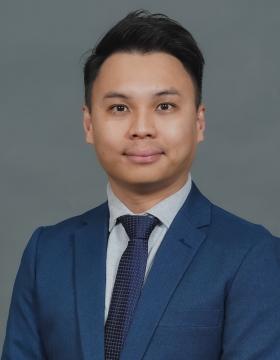
Associate Professor
Adison WONG
Associate Professor
Teaching & Learning (T&L) Lead, Food, Chemical & Biotechnology Cluster
Member, Entrepreneurship Education Committee (EEC)
PhD (Bioengineering), Imperial College London, United Kingdom
Cluster:
Food, Chemical and Biotechnology
Profile
SIT Appointments
- Member, Entrepreneurship Education Committee (EEC)– Present
- Teaching & Learning (T&L) Lead, Food, Chemical & Biotechnology Cluster– Present
- Associate Professor– Present
- Programme Leader, Bachelor of Engineering with Honours in Pharmaceutical Engineering–
- Assistant Professor–
- Lecturer–
Education
- PhD (Bioengineering)Imperial College London , United Kingdom
- BEng (Chemical and Biomolecular Engineering) with First Class HonorsNanyang Technological University , Singapore
Achievements
- Associate Partner for Innovation, School of Science and Technology Singapore
- Singapore Teaching and Academic Research Talent Award, Ministry of Education
- 2011 Best research article in Molecular Systems Biology, EMBO & NPG
- 2011 Top 10 Singapore Research, Singapore Straits Times
- 2011 Best Application Research, 5th International Meeting on Synthetic Biology
- Dean's List in Chemical and Biomolecular Engineering Degree Program
Professional Memberships
- Honorary General Secretary, Society of Synthetic Biology SingaporePresent
- ExCo Committee, International Society for Pharmaceutical EngineeringPresent
- Associate Editor, Engineering Biology Journal (Wiley)Present
Research
Research Interests
- Precision Fermentation & Bioprocessing
- Smart Biosensing & Diagnostics
- Food Waste Valorization
Current Projects
- Next-generation bioprocess development for terpenoid production in Escherichia coli– Present
Co-PI, Industrial doctorate program with ASTAR
- Addressing fuel biocontamination through the development of highly specific neutralizing peptides and rapid bio-detection platforms– Present
Co-PI, funded by MINDEF Singapore
- Fermentation of single cell proteins as a nutritious, sustainable and affordable protein source– Present
PI, funded by Lee Foundation
Past Projects
- Developing a scale-up platform for adoptive cell therapy–
Co-PI, funded by Ministry of Education Singapore (MOE TIF)
- Exploring virtual reality to improve chemical engineering learning outcomes–
Co-PI, funded by Ministry of Education Singapore
- Cell separation using microfluidics technology–
PI, funded by SIT Ignition Grant
- Development of next generation antimicrobial peptides for antimicrobial therapy and protection–
Collaborator, funded by US Air force
Publication
Journal Papers
You can find my publication list on LinkedIn: Adison Wong's LinkedIn Profile.
Teaching
Teaching Modules
Pharmaceutical Engineering, BEng (Hons)
- PHE4012 - Plant Design and Operations
- PHE3232 - Bioprocess Engineering
- PHE3233 - Cell Culture Laboratory
- PHE3239 - Unit Operations 2 (Purification and Isolation)